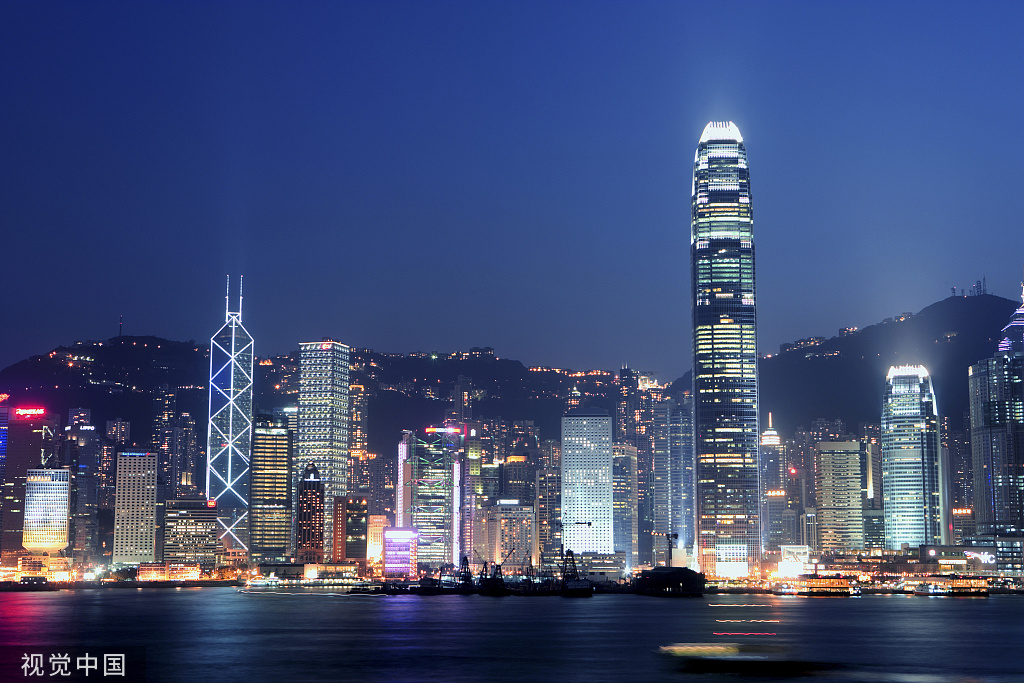
Victoria Harbour, Hong Kong, China. [Photo/VCG]
Hong Kong will remain a global financial hub despite escalating Sino-US tensions, worsened by Washington's recent threat to impose sanctions on the city, a leading economist from the United States said.
The possible sanctions, which would revoke Hong Kong's tariff privileges or tighten US export controls over the city, will have "almost no effect" on the city's economy, said Nicholas Lardy, a senior fellow at the Peterson Institute for International Economics, a Washington-based think tank.
Hong Kong's status as a global financial center won't be undermined by sanctions because the city was built on a complex ecosystem, said Lardy, an expert on China's economy, in an interview with China Daily.
"Its preconditions are a freely convertible currency and a very strong network of financial institutions. Banks, security firms, asset management companies, accounting and law firms constitute a very powerful mix that gives Hong Kong a continued substantial advantage," he said.
Elaborating on why the impact of sanctions would be minimal, Lardy said most products shipped from Hong Kong to the US are not made in Hong Kong, as the city's manufacturers have relocated their factories to the Chinese mainland decades ago, where products are already subject to high tariffs.
According to the Hong Kong government, local products exported to the US accounts for less than 0.1 percent of annual total export value in 2019.
The other option for the White House is to place US exports to Hong Kong under a stricter licensing regime, especially those related to the use of US technology, Lardy said. "But the total share of US exports to Hong Kong that required a license was only 1.2 percent of the total (in 2018). Its overall effect would be imperceptible.
"Maybe these privileges were important back in the 1990s, but they're really irrelevant for Hong Kong today," said Lardy, who believes the US is "extremely unlikely" to go as far as cutting off the city from the SWIFT system, a global messaging network for bank financial transactions.
He said Hong Kong will become more irreplaceable for China as many corporations listed in the US may take a secondary listing in the city to allow international investors to maintain their stakes in these companies.
Last month, the US Senate passed a bill that could disqualify many Chinese companies from listing their shares on US exchanges, or raising money from US investors. For this proposal to become law, the US House also would need to pass the bill, and then US President Donald Trump would have to sign it.
"If this were to happen, and it might well happen, Hong Kong's importance for the mainland will become even greater, although it's not going to happen overnight," said Lardy, who expects the delisting process to take two or three years.
Economic rebound
Hong Kong's economic growth in the first quarter of 2020 has hit a record low of negative 8.9 percent, with the unemployment rate at a 15-year high of 5.9 percent for the March-May period, under the dual pressure from the coronavirus pandemic and months-long anti-government protests.
Lardy said he is not optimistic that Hong Kong's economy can quickly pick up in the post-pandemic era because the city relies heavily on tourism, an industry that had already been hit hard by demonstrations even before the pandemic.
Tourists won't come back as long as demonstrations and street violence are a factor, Lardy said, predicting economic recovery to be further put off by protests after the enactment of the national security law in the city.
Hong Kong, as a major transit hub that benefits from global trade activities, won't recover to its previous prosperity for the rest of 2020, said Lardy, citing multiple pessimistic forecasts about shrinking global trade.
As for the mainland, the economist noted many companies operating there have been increasing their investments because the outbreak has been relatively contained, so that they can depend less on parts and components shipped from overseas.


